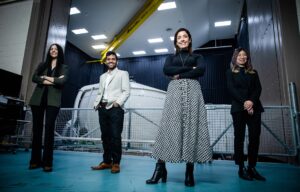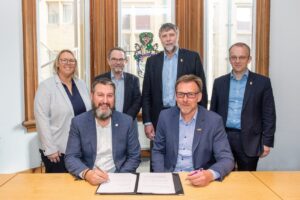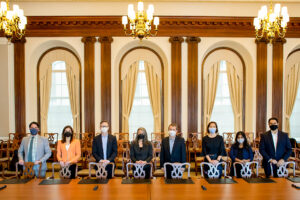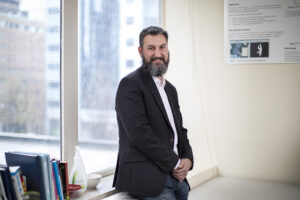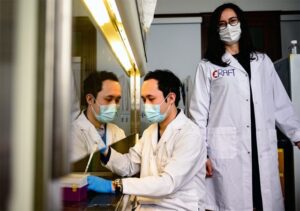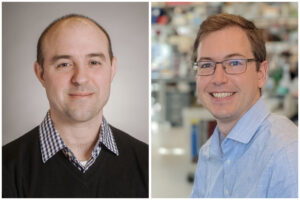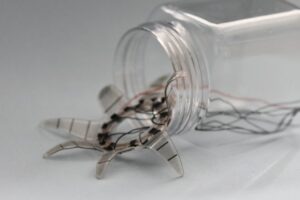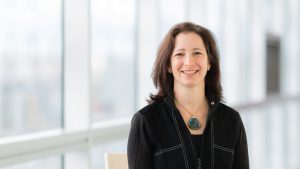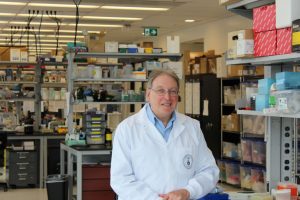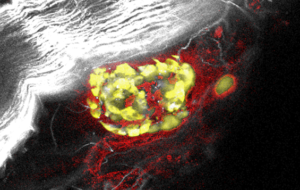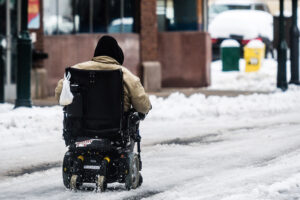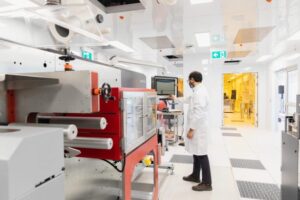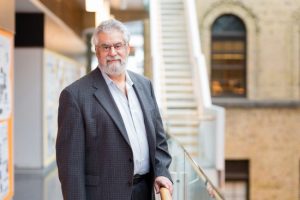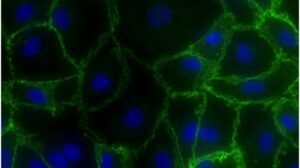Research News and Stories
Explore the latest news, stories, and groundbreaking research happening at the Institute of Biomedical Engineering. Stay updated on innovative projects, impactful discoveries, and the achievements of our talented students, faculty, and alumni shaping the future of biomedical science and engineering.
Quick Navigation
Dr. Molly Shoichet to receive an honorary Doctor of Science degree from University of Alberta
A diverse group of 14 outstanding achievers will receive the university’s highest honour this June.
Training tomorrow’s top talent
Dr. Jennifer Campos knows it’s her job to support a very special group. She oversees some of the world’s most accomplished scientific trainees, who are all devoted to furthering rehabilitation research that will improve the lives of aging Canadians and those who have experienced an illness or injury.
New funding for researchers and a Centre for Digital Health agreed by the Manchester-Melbourne-Toronto Alliance
The Universities of Manchester, Melbourne and Toronto have announced new funding to develop bi- and trilateral research projects, and a declaration to establish a new International Centre for Translational Digital Health.
U of T partners with Moderna to advance research in RNA science and technology
Dr. Omar Khan’s lab is creating new nanotechnologies to control and deliver nucleic acids, will lead a team that plans on working with Moderna to develop next-generation vaccine platforms.
National platform to prepare researchers to lead digital health solutions for older adults
A federally funded training platform hosted at the University of Toronto will equip students and early career researchers across Canada to accelerate digital health solutions for older adults with complex health needs.
Nine projects supported by 2022 Connaught Innovation Awards
Drs. Milos Popovic and Craig Simmons are two BME faculty whose research are funded by this year’s Connaught Innovation Awards.
Organ-on-a-chip research identifies new strategy for treating health complications associated with COVID-19
Using their novel organ-on-a-chip platform, Milica Radisic’s research team has identified a molecule with the potential to combat one of the most severe complications of COVID-19 infections.
2022 Dorrington Awards Recognize Graduate Students Working on Cancer, Diagnostics and Drug Delivery
Two BME students receives Dorrington Graduate Award.
TRANSFORM HF Announces Winners of Inaugural Seed Grant Competition
Drs. Aaron Wheeler and Daniel Franklin are two BME faculty who received University of Toronto Strategic Initiative awards $150K towards innovative heart failure research.
From soft robotics to treating neurological disorders: Three U of T Engineering projects supported by CFI
Dr. Tom Chau was one of three engineering projects supported by CFI.
Getting a good grip
Drs. César Márquez Chin and Milos Popovic, with their former PhD student, Dr. Lazar Jovanovic, have created a platform called KITE-BCI that will enable the technology to be more practically deployed in rehabilitation clinics around the world.
Two BME faculty receives Catalyst Grants
Drs. Alison McGuigan and Rodrigo Fernandez-Gonzalez received Data Science Institute Catalyst Grant, co-funded by Medicine by Design, on their work on bioimaging on cancer treatments.
Medicine by Design announces two new Pivotal Experiment Fund projects
University of Toronto (U of T) professors Shana Kelley, Leslie Dan Faculty of Pharmacy, and Molly Shoichet, Institute of Biomedical Engineering, will be supported by Medicine by Design’s Pivotal Experiment Fund to spin-off aspects of their research into an early-stage product concept or venture.
Zebra mussels could point the way toward non-stick surfaces and medical adhesives
A water tank full of coin-sized invertebrates may not be the first thing you’d expect to see in a materials science and engineering research lab.
Mending the Gap: Professor Molly Shoichet joins multidisciplinary team working to develop new treatments for spinal cord injuries
Spinal cord injuries can be devastating to those who experience them. Currently, almost no options are available to reverse the effects, which can include paralysis, chronic pain and loss of bladder control. But an international team of researchers — including University Professor Molly Shoichet (ChemE, BME, Donnelly) — hopes to change that.
New Medicine by Design-funded research advances an under-skin cell therapy for type 1 diabetes
New Medicine by Design-funded research out of the lab of Michael Sefton continues to advance one of his lab’s goals: developing a cell-based treatment for type 1 diabetes that can be implanted under the skin and would eliminate the need for insulin injections.
Mobility scooters not up to winter’s icy challenge, researchers say
Geoffrey Fernie, a professor of surgery with appointments at the Institute of Biomedical Engineering and the Rehabilitation Sciences Institute and a senior scientist at the University Health Network’s KITE Research Institute, works with a research team to look at mobility scooters and there performance on road conditions during Canadian winters.
BME researcher receiving New Frontiers in Research Fund
Hai-Ling Margaret Cheng was one of the UofT researchers receiving the New Frontiers in Research Fund.
‘Only a matter of time’ before omicron COVID-19 variant reaches Canada, expert says
Dr. Omar Khan comments on the recent news on Omicron variant.
Milestone launch: CRAFT Device Foundry welcomes new era of microfluidic device fabrication
The Centre for Research and Applications in Fluidic Technologies (CRAFT) — a partnership between the University of Toronto and the National Research Council of Canada (NRC) — has launched a new research facility at U of T’s St. George campus.
100 years after insulin treatment was invented, researchers hope to ditch needles once and for all
Canadian scientists made one of the most important discoveries in the history of medicine 100 years ago when Dr. Frederick Banting and his assistant, Charles Best, successfully isolated the hormone insulin in Banting’s lab at the University of Toronto.
Engineering a new approach to building blood vessels that work
In the 4th volume of Nature’s Communications Biology, researchers at TBEP published an important study that can reshape the way we engineer new blood vessels for patients who need them.
Winter is Coming
A new study from UHN’s KITE Research Institute reveals that mobility scooters perform poorly under the snow- and ice-covered road conditions that are common during Canadian winters.

